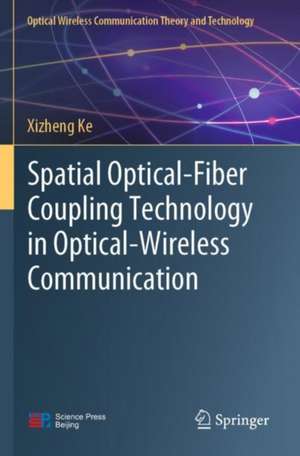Spatial Optical-Fiber Coupling Technology in Optical-Wireless Communication: Optical Wireless Communication Theory and Technology
Autor Xizheng Keen Limba Engleză Paperback – 4 iul 2024
| Toate formatele și edițiile | Preț | Express |
|---|---|---|
| Paperback (1) | 727.25 lei 38-44 zile | |
| Springer Nature Singapore – 4 iul 2024 | 727.25 lei 38-44 zile | |
| Hardback (1) | 886.62 lei 22-36 zile | |
| Springer Nature Singapore – 3 iul 2023 | 886.62 lei 22-36 zile |
Preț: 727.25 lei
Preț vechi: 956.91 lei
-24% Nou
Puncte Express: 1091
Preț estimativ în valută:
139.20€ • 151.26$ • 117.01£
139.20€ • 151.26$ • 117.01£
Carte tipărită la comandă
Livrare economică 16-22 aprilie
Preluare comenzi: 021 569.72.76
Specificații
ISBN-13: 9789819915279
ISBN-10: 9819915279
Ilustrații: X, 226 p. 133 illus., 90 illus. in color.
Dimensiuni: 155 x 235 mm
Ediția:2023
Editura: Springer Nature Singapore
Colecția Springer
Seria Optical Wireless Communication Theory and Technology
Locul publicării:Singapore, Singapore
ISBN-10: 9819915279
Ilustrații: X, 226 p. 133 illus., 90 illus. in color.
Dimensiuni: 155 x 235 mm
Ediția:2023
Editura: Springer Nature Singapore
Colecția Springer
Seria Optical Wireless Communication Theory and Technology
Locul publicării:Singapore, Singapore
Cuprins
Introduction.- Fiber-optic mode theory.- Single-lens single-mode fiber coupling under ideal conditions.- Spatial plane-wave single-lens single-mode fiber coupling in weakly turbulent atmospheres.- Automatic fiber-optic-coupling alignment system.- Mode-conversion methods.- Adaptive-optical wavefront correction.
Notă biografică
Ke Xizheng,Doctor of Science, tenure-term professor, Deputy Director of Shaanxi Provincial Key Laboratory of Intelligent Collaborative Network Military-Civilian Joint Construction, famous teacher of Shaanxi Province, academician of Chinese Society of Electronics, foreign academician of Russian Academy of Natural Sciences, Council member of Chinese Society of Optical Engineering, Executive director of Shaanxi Provincial Optical Society. He received his bachelor's degree from Shaanxi University of Technology in 1983 and his Doctor of Science degree from the University of Chinese Academy of Sciences in 1996. From 1997 to 2002, he conducted postdoctoral research at Xidian University and the Second Artillery Corps Engineering College. Dr. Ke is a member of the editorial board of the Journal of Electronics, Infrared and Laser Engineering, Journal of Electronic Measurement and Instrumentation, Laser Technology, Applied Optics, Journal of Xi 'an University of Technology, Journal of Timeand Frequency, and Atmospheric Science Research. National Science and Technology Award evaluation expert, Shaanxi Provincial Academic Degree Committee discipline evaluation group member. In 2000, Dr. Ke was awarded the Outstanding Young Scholar Award of the Chinese Academy of Sciences. In 2009, he was awarded the title of "Excellent Science and Technology Specialist of Guangdong Province" by the Ministry of Science and Technology. In 2015, it was awarded the title of "Golden Phoenix on Green Poplar" in Yangzhou City. In 2018, it won the China Industry-University-Research Innovation Award, and in 2019, it won the China Industry-University-Research Innovation Achievement Award. Since 2001, he has won 16 provincial and ministerial science and technology awards, including 1 first prize and 5 second prizes. He has obtained more than 20 national authorized invention patents, published 9 monographs in science Press, and published more than 400 academic papers in domestic and foreign journals.More than 30 doctoral students have been trained in his direction.
Textul de pe ultima copertă
This book analyzes the development of space light-fiber coupling research, highlights its importance, examines the underlying theory and key problems, and elaborates on methods to improve the space light-fiber coupling efficiency. Starting from the basic theory of electromagnetic field, the transmission characteristics of light in optical fibers are expounded, and the coupling characteristics of optical signals of different modes are investigated. The spatial light-fiber coupling techniques such as mode conversion method, lens coupling method, and wavefront distortion correction method are discussed in detail, and the key technologies involved are verified by experiments. This book is suitable for the vast majority of engineering and technical personnel and teachers in colleges and institutions who are engaged in wireless optical communication. It can also be used to train senior undergraduates and graduate students in relevant fields.
Caracteristici
Solves the space fiber-fiber coupling technology from both theoretical and practical aspects Summarizes related work on space fiber coupling Researches on space light-fiber coupling efficiency






